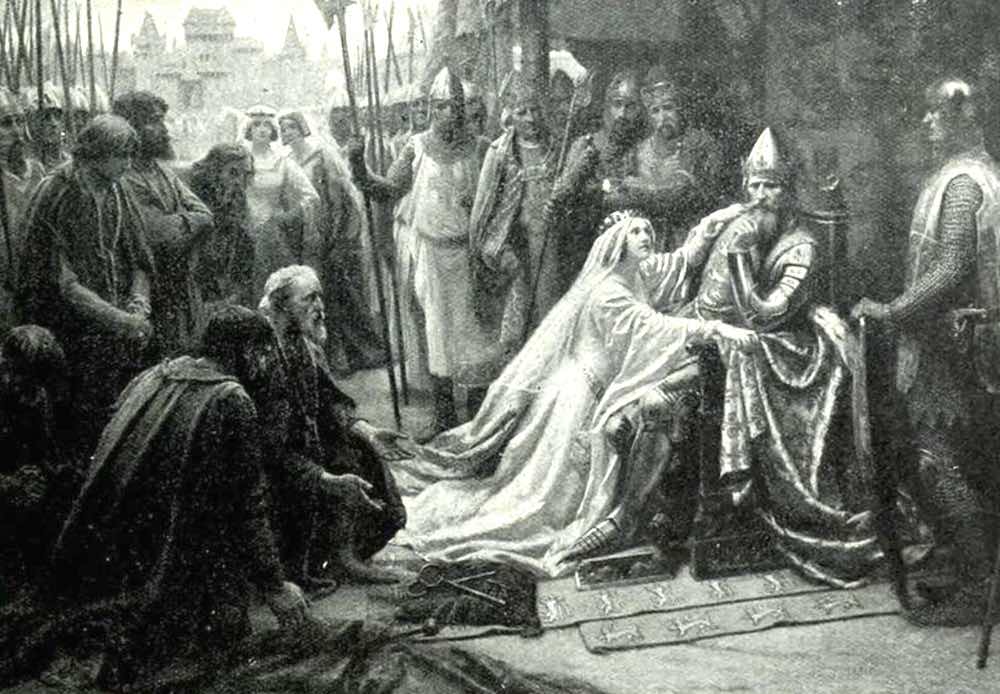Prince Edward— the future Edward III—fell in love with Phillipa when he went with his mother, Isabella of France, to Hainault in the summer of 1326. Isabella was there to ask Count William to support her bid to depose her husband and put the Prince on the throne in his place, and to reassure the Count that she was totally behind a match between one of his daughters and the future King of England.
Why was Phillipa such good catch?
Well,her mother was the granddaughter of Philip III of France and her father was descended from Louis VII of France. English wool, particularly from the Welsh Marches, the South West and Lincolnshire, was a valuable commodity and England’s main economic export. The wool sent to specialist cities in the Low Countries, France, and Italy, which used “the pedal-driven horizontal loom and spinning wheel, along with mechanised fulling and napping,” to produce superior textiles.
Hainault specialized in cloth production. Thus, it was a very astute economic move for King Edward II to marry his son to a daughter of Hainault.
Queen Isabella of France and her main ally/advisor, Roger Mortimer, were bright enough to embrace this plan even after they had deposed Edward II and were acting as regents for the newly-crowned boy-king. Moreover, they wouldn’t have cared which of William’s daughter King Edward III married, because any of them would have come with a huge dowry and connection to the wool trade and textile industry. Isabella and Mortimer were desperate to pay for the troops needed to fight in Scotland and on the continent, but they needed to raise funds while avoiding the use of the word “tax”. They arranged a “levy” on exported wool as a “loan” from merchants.
Philippa married Edward first by proxy, exchanging vows with the Bishop of Coventry at Valenciennes in October of 1327 before setting sail for England with her courtiers and her uncle, John of Hainaut. They reached England in late December, and Philippa entered London just before Christmas, where a “rousing reception was accorded her”. She and her young groom were remarried in person on 24 January 1328 at York Minster, after which the young couple went to Woodstock Palace in Oxfordshire to live.
On a personal front her charity and her concern for her people was celebrated far and wide. Philippa was hailed by medieval writers as “a very good and charming person who exceeded most ladies for sweetness of nature and virtuous disposition”, and the “most gentle Queen, most liberal, and most courteous that ever was Queen in her days.”
In fact, for the 40 years that she and Edward were married, she spent a great deal of her time trying to modify his ruthlessness.
A renowned example of her kindness on the international stage was her efforts to convince her husband to spare the lives of the Burghers of Calais in 1347 after he besieged and captured that city. When the burghers were brought before the king, the “pregnant Philippa came forward on her knees, weeping … She said she had asked for nothing since joining him in Calais but she was now asking the King to take pity on these poor men and for the love of her, to spare them.” Her pleas worked, in spite of Edward’s extreme anger toward the Burghers, because his love for his wife was even greater than the force of his impulsive temper. Without Philippa’s constant modifications on Edward’s snap judgments, he would have probably been remembered more for brutality than kingship.
Another famous instance of Philippa’s mercy came in 1331, during her mother’s visit to England with the final installment of Philippa’s ample dowry. At one of the tournaments to celebrate the Countess’s visit, some shoddy carpentering resulted in the collapse of the platform on which the ladies were seated. No one was hurt, but Edward was livid with the thought his queen could have been hurt and embarrassed that English workmanship failed in front of his international visitors. He was all set to hang the carpenters, including an apprentice of only 14 years old, but Philippa went down on her knees in public to beg the king to spare their lives. Moved, Edward forgave them, and Philippa’s kindness became legendary.
